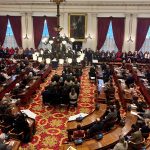Land Use Modernization is an Essential, and Affordable, Housing Solution
Legislators discussed important land use reports this week, in the Senate Economic Development, Housing, and General Affairs Committee, the House Environment and Energy Committee, and the Rural Caucus. This session is an opportunity to craft legislation that encourages more housing to be built in viable locations, without appropriating large sums of money. In particular, the Vermont Chamber is advocating for housing solutions that incentivize new development in and around our community centers as outlined in the Vermont Natural Resources Board report on necessary updates to Act 250.
Megan Sullivan, VP of Government Affairs, was on the Steering Committee for the report, which underscores the need for strategic changes to Vermont’s land use policy. This work brought together stakeholders with diverse perspectives to reach an agreement on how to best center modernization and incentivize essential housing development in smart growth areas. Several bills have been introduced that would be vehicles for progress in this area and the Vermont Chamber will be engaged throughout the session to ensure real progress is made.
RECENT HOUSING NEWS








